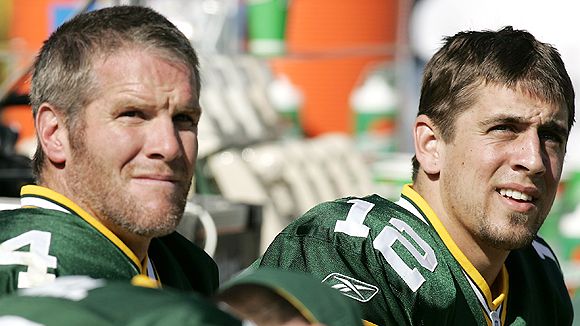
Favre and Rogers while still teammates
Sports Saturday
Something memorable occurred last Sunday in Dallas in addition to the Green Bay Packers bringing “Vince Lombardi home” in their Super Bowl victory over the Pittsburgh Steelers. Quarterback Aaron Rogers stepped out of the shadow of a legend.
The literary equivalent that comes to mind is Homer’s Telemachus, but Rogers is Telemachus with a twist. While their paths coincide in a number of ways, unlike Telemachus this modern-day son of Odysseus has actually displaced his epic predecessor.
I’ve written about Favre a couple of times (here and here), how this charismatic quarterback who owns many of football’s most cherished records was also a drama queen who hoarded all the spotlight to himself. Television couldn’t keep its eyes off of him, and when he teased the Packers by his retirements that weren’t retirements, he split the Green Bay community. Then, in the 2009 seasons, he made things even worse, twice beating his old team as he led their bitter rival, the Minnesota Vikings, to the championship game. In the process, he had one of the great seasons ever. At age 40!
Back when Favre was strutting his stuff in Green Bay, Rogers was quietly learning his craft. His chance came in 2008 when Favre finally left to join the New York Jets. Throughout his first season as a starter, however, Rogers was constantly compared to Favre and found wanting.
That’s what it is like to be Homer’s Telemachus as well. At 19 he watches helplessly as suitors for his mother’s hand crowd into his house and feast on provisions that should be his. At the beginning of the epic, however, he is starting to test his powers. He does so first by stepping up in a counsel meeting and complaining. The suitors, who have heretofore seen him as an impotent boy, start to take notice.
He gets their attention again when, with the help of Mentor, he organizes an overseas expedition to see if he can discover what has happened to his father. Not thinking him capable of such leadership, one of the suitors says,
A bad business. Telemachus had the gall
to make that crossing, though we said he could not.
So the young cub rounds up a first rate crew
in spite of all our crowd and puts to sea.
What devilment will he be up to next time?—
Telemachus may be developing into a leader, but he still has a long way to go. He doesn’t feel that he is worthy to approach Nestor and Menelaus, legendary friends of his father, to ask them for news. Furthermore, while these see the family resemblance and compliment him, repeatedly they say that, if only Odysseus were to return, he would route the suitors. Never once do they say Telemachus might be able to do the job. Many times in his first two seasons as a starter Rogers heard the words, “If only Favre were still here . . .”
From this perspective, Favre could be compared to the Odysseus in Alfred, Lord Tennyson’s famous poem “Ulysses.” Tennyson’s Ulysses, like Favre, is a drama queen, never ready to give up, even if it means taking his sailors to their doom—which Favre did in his last season with the Vikings and which Ulysses did in Dante’s version of the story, which Tennyson is drawing on. (“It may be that the gulfs will wash us down,” says Ulysses of the rash voyage he is about to undertake—and they do.) Cocky to the end, Ulysses, like Favre, almost has contempt for the man who has grown up quietly while he was running around being an epic hero. The following speech all but says, “hey, it’s okay it he wants to be a colorless bureaucrat while I’m off venturing into that untravelled world beyond the sunset, whose margin fades for ever and for ever when I move”:
This is my son, mine own Telemachus,
To whom I leave the sceptre and the isle —
Well-loved of me, discerning to fulfil
This labour, by slow prudence to make mild
A rugged people, and through soft degrees
Subdue them to the useful and the good.
Most blameless is he, centred in the sphere
Of common duties, decent not to fail
In offices of tenderness, and pay
Meet adoration to my household gods,
When I am gone. He works his work, I mine.
Let Rogers follow all the rules and stay quietly at home. I, meanwhile, will be seizing destiny.
Who knows, if Green Bay had had the folly to bring Favre back (not that this was ever a possibility except in the minds of certain unhinged fans), perhaps he would have done the football equivalent of slaughtering the suitors. Some commentators still believe that Green Bay would have won the Super Bowl last year if they had had Favre. If Favre had indeed pulled that off, then Rogers would have been relegated to the same position as Telemachus in Homer’s epic. Once Odysseus returns, his son slips comfortably back into the role of lieutenant as his father retakes center stage and directs operations.
The story got rewritten in Super Bowl XLV, however. It’s as though Favre left permanently for Team Calypso (the island nymph who holds Odysseus captive), leaving the coast clear for Rogers to take over. Although the Packers barely made it into the playoffs, Rogers then effortlessly dispatched the #3 seeded Eagles, the #1 seeded Falcons, and the #2 seeded Bears. Then he won Most Valuable Player in the Super Bowl by vanquishing the Steelers.
The King of Ithica is dead. Long live the King of Ithica.

